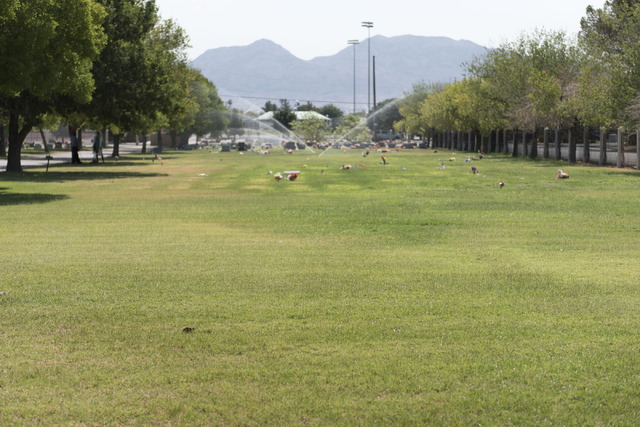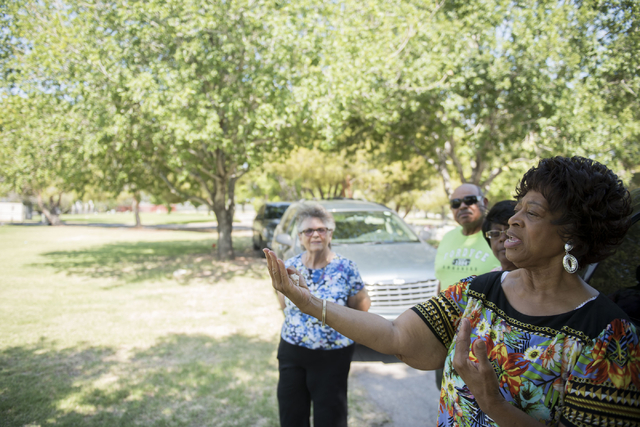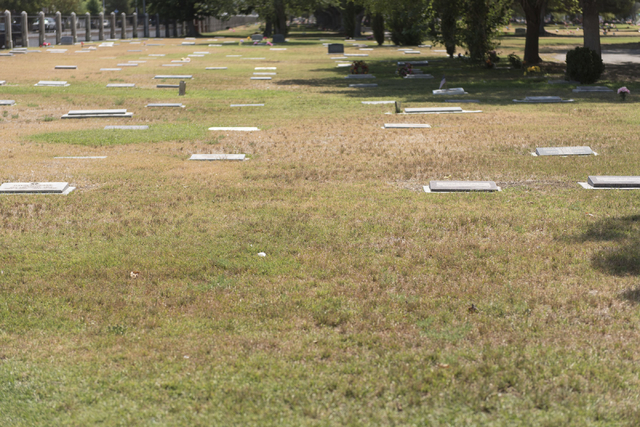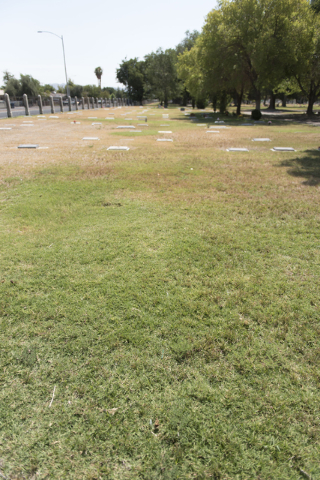Las Vegas genealogy societies hope to raise $17K for memorials to honor unmarked graves at Woodlawn
Las Vegas resident Betteann Meyers can trace her family history at least eight generations back. She has been studying her genealogy for 20 years and until recently was able to connect another branch to her family tree using marriage records of distant relatives in Virginia.
She fears that for families of some of the deceased buried at Woodlawn Cemetery, 1500 Las Vegas Blvd. North, locating their lost relatives might not be as easy as it was for her.
The Nevada African-American Genealogy Society and the Centennial Las Vegas Genealogy Society help members such as Meyers who are interested in digging up their family roots. Their instructors teach the members what documents to start looking through and what search tools are available.
During one of the societies’ joint events, the genealogists decided to walk along the Pioneer Trail, a 4-mile trail with 16 historical locations significant to early Las Vegas. One of the stops that interested them was Woodlawn, one of the city’s earliest cemeteries.
Before Woodlawn’s opening in 1914, Dennis McBride, director of the Nevada State Museum, said that Las Vegas families would often bury their loved ones on their own plots of land. Over time, however, many graves were forgotten, and their markers disappeared.
Several informal burial grounds bordered Woodlawn’s current location, and after its opening, any early burials discovered outside cemetery boundaries have been reinterred there. In the 1970s, many bodies were found underneath Owens Street while it was being widened.
McBride said some of the remains were reinterred in Woodlawn without markers or any other form of identification.
This fact did not settle well with Meyers, who insisted that the Nevada African-American Genealogy Society and Centennial Las Vegas Genealogy Society, of which Meyers is a member, do something to help.
“It just appalled me that there wasn’t something to dignify the souls of the people who were there,” Meyers said. “Genealogy is all about researching your ancestors, and those people who lay under there with no recognition — nobody to know who they are — it just breaks my heart to think that there are people out there who have somebody, somewhere, and nobody knows about it.”
The societies are raising $17,000 to place two memorials at Woodlawn Cemetery. Fundraising events are being planned, and they are hoping to have the memorials up by Memorial Day 2017.
“We want to put some kind of a memorial for these unknown souls so that people will recognize that there’s actually people there and that they deserve the dignity of being recognized even if no one knows who they are,” Meyers added.
One memorial will be laid in the Cypress sections, Clark County’s burial site for indigent individuals, defined as people who died without enough resources to pay for their funeral or without family to claim them.
Indigents pass under the care of Clark County Social Services, which is entitled to provide them with a proper funeral.
Before the popularization of cremations, indigents were typically buried in cemeteries such as Woodlawn. Because markers are not required to go along with graves, much of the Cypress sections sit without markers to show where the deceased lay.
Jonathon Laskie, family services manager at Bunkers Mortuaries, Cemeteries & Crematory, which manages Woodlawn, said that there is a record of the names of most people buried in the unmarked graves. When people are searching for their loved ones in Cypress, all they have to do is give the name of the person, and Bunkers staff can show them to the gravesite.
However, Laskie said Bunkers’ records are only as good as what the county provides, and he doubts that there is a comprehensive list of names of all people buried in Cypress, especially for early burials. There are old maps for each section in Woodlawn with names handwritten over each plot site. Finding the name of every person with an unmarked grave would take a great deal of time, he said.
The societies also plan to add a memorial in Section O, the historical burial site for blacks before desegregation. The memorial will honor all blacks with unmarked graves.
Darell White, president of Nevada African-American Genealogy Society, said she expects to get help from the entire Las Vegas community as Woodlawn is city-owned and therefore owned by everyone.
“I think people will reach out and understand that it’s a humanistic thing,” White said. “These people need to be memorialized.”
To contact the Nevada African-American Genealogy Society, email president Darell White at cwbydwdarell@yahoo.com. To contact the Centennial Las Vegas Genealogy Society, email president Linda Rains at casa_linda@cox.net.
To reach reporter intern Rocio Hernandez, email rhernandez@reviewjournal.com or call 702-387-5233. Find her on Twitter: @rociohdz19.


























